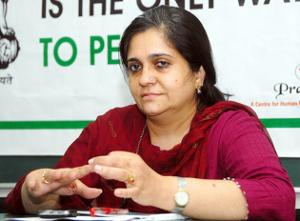Mumbai, Jul 24: A special CBI court here today rejected the anticipatory bail application of social activist Teesta Setalvad and her husband filed in connection with a case registered by CBI alleging that her company received Rs 1.8 crore from abroad without mandatory approval from Centre.
 "The anticipatory bail application is rejected," said Special judge Anis Khan while turning down the plea.
"The anticipatory bail application is rejected," said Special judge Anis Khan while turning down the plea.
Setalvad and her husband Javed Anand had moved the court for bail on July 17. Immediately after the order, Setalvad told the court that she was shocked.
"I am shocked and aggrieved by the verdict as this is a petty offence. My sympathisers feel that this is an attempt (by the government) to intimidate and possibly eliminate us by the powers (sic)."
The CBI had on July 8 registered a case against Setalvad and Anand alleging that her firm Sabrang Communication and Publishing Pvt Limited (SCPPL) received around 2.9 lakh USD in foreign donations in violation of Foreign Contribution Regulation Act (FCRA).
According to the agency, SCPPL was not registered under FCRA for collecting money from abroad and the amount of nearly Rs 1.8 crore (2.9 lakh USD) was, therefore, received in violation of the Act as the organisation needed to seek prior approval from the Union Home Ministry.
Teesta and her husband, through their lawyer, had told the court that they were innocent and were falsely implicated.
Her advocate Mihir Desai told the court that the only reason why the agency wanted to arrest them is to humiliate them for their work in Gujarat.
However, CBI in their reply, last Friday, had said that motive behind the transfer of foreign contribution to SCPPL reflected interference towards the internal security and activities of India.
"Such act of foreign donor would prejudicially affect the security, strategic, scientific and economic interest of the state and also affect the harmony between religious, social, linguistic or regional groups, castes or communities", the CBI had said in its reply while opposing her plea.
The agency said the allegations against them (Setalvad and Anand) are serious in nature and it is proposed to unravel all the contours of the offence and the conspiracy during the investigation.
Setalvad alleged that the FIR registered against her and her husband was for the purpose of harassing and torturing them, a charge rejected by CBI.
"The applicants are deliberately mixing up the offences alleged against them with non-related issues in order to divert the attention from the serious charges against them," the agency had said.
The CBI had also told the court that when their premises were searched on July 14 this year there was total resistance and non-cooperation from their side.
"During the search, an agreement dated September 22, 2006 between Ford Foundation and SCPPL were seized which clearly showed that the remittances were grants. There is no mention of any 'consultancy' therein," the reply had said.





Comments
Add new comment